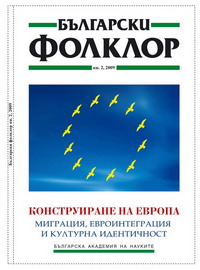Македонските студенти в България и българският паспорт: прагматизъм срещу емоции
Macedonian Students in Bulgaria and Bulgarian Passport: Pragmatism versus Emotions
Author(s): Maria BarzinskaSubject(s): Anthropology
Published by: Институт за етнология и фолклористика с Етнографски музей при БАН
Summary/Abstract: The paper will present a new but visible and relatively big group in the Bulgarian society, the Macedonian students, through their wish to obtain Bulgarian citizenship and passport. In the last years Macedonia passed through crucial events – starting with the separation from former Yugoslavia and ending with the conflict in 2001 that lead to an actual division of the Macedonian society in two parts – Macedonians and Albanians. The close geographical location, the plethora of shared marks for both Bulgaria and Macedonia, Bulgaria’s EU membership and others are the main reasons for the young Macedonians to come to study in Bulgaria. Many factors come in addition to produce a unique and strong wish to obtain Bulgarian citizenship/ passport. The process attracts a lot of pragmatism and public attention, rises many discussions and evokes emotions. The paper will present the motives for this wish. First of all, the vast majority of Macedonian students apply for Bulgarian citizenship and wants to obtain the passport as soon as possible. The passport becomes a “dream” about the escape from the Macedonian “visa ghetto”. Secondly, the reasons to apply for Bulgarian passport are in the majority of the cases very pragmatic and determined by the escape wish. Students desire to be able to travel abroad, in order to work or continue to study without restrictions (where possible); obtaining Bulgarian citizenship and passport is seen as one of the ways for achieving this. A crucial event connected to their wish is the recent EU-membership of Bulgaria. Furthermore, these processes attract a lot of media and public attention and become a subject of heated discussions. The paper will present also statistical data about the increase of number of applications within the last five-ten years, the actual state of received passports/ citizenship and will give possible trends of the processes in the near future. The combination between the characteristics mentioned above give their share to the study of Macedonian young people in Bulgaria and their unique identity. It lets us know them better, develop the student temporary migration research further and help for establishment of adequate state policy on migration.
Journal: Български фолклор
- Issue Year: XXXV/2009
- Issue No: 2
- Page Range: 70-82
- Page Count: 13
- Language: Bulgarian
- Content File-PDF

